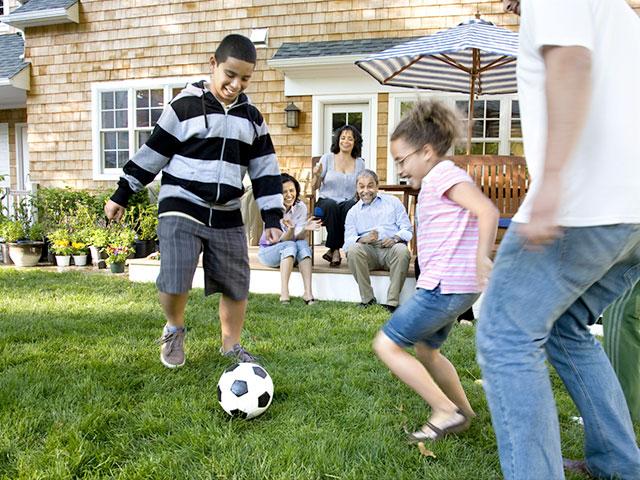Families That Play Together, Stay Together

This may sound like an oversimplification, but the family that isn’t “working” is the family that isn’t playing together. Playing together is an essential trait of happy, healthy families. Certainly our children need to do their chores, and of course they need discipline with consistency, but what they also need desperately from their parents is a rousing game of hide-and-seek or a monthly Ping-Pong tournament.
A great thing happens to families when they play together: They begin to talk and laugh and lighten up. Family memories are built, inside jokes are shared, and serious moments of intimacy are communicated. Families need special times together to build lifelong memories and to play together.
As most experts will tell you, a family that plays together stays together. But I would add that a family that plays together will also be much more happy and healthy. For many families, play is the missing ingredient that glues the family together. Play can even open closed spirits and heal broken marriages.
We know instinctively that play produces family togetherness and support. We know that when we play together, we have a deeper sense of belonging and community in the family. Parents must proactively work at making a sense of belonging and community one of their key goals for family togetherness.
Playing together as a family may open up the communication lines better than anything else you try, so now is the time to be proactive and create those family fun days and events that provide the catalyst for more effective communication. Do whatever it takes to keep the lines open, even if it means picking up a basketball or going to the park on a regular basis. Playing together and having a good time just may be the safety net you need to make a difference in your child’s life.
Todd Dean is one of my heroes. I’ve known him much of my adult life. He is a talented person with an M.B.A. from Stanford University. At the university, Todd was a gymnast. When I first met him, he was teaching students from my youth group to do a standing backflip. All I could do was think about liability, and yet the kids loved watching him do his incredible flips. He invited me to try a backflip. I made a fool of myself, but he still encouraged me.
Todd married Charlotte. They had two beautiful children, and he had a very high-paying job. Todd’s career was going through the roof. Then tragedy struck: Charlotte died of a brain tumor. Before Charlotte died, Todd had told me he wanted to coach his children’s little league and soccer teams. Because Todd’s career would soon include travel, he had to make some difficult decisions about his career. Todd was making good money, but it wasn’t as important as playing catch with his son or rollerblading with his daughter.
Todd made the decision to quit his high-paying job and become a professor, so he could play more with his kids and coach those teams. His annual salary was cut to what was once his annual expense account. His lifestyle had to change. He doesn’t live in as large a house as he once did, and his car isn’t the same model as some of his Stanford M.B.A. friends; but he is happily coaching his children’s teams. He is now married to a lovely woman named Becky who suffered a similar loss. They have four happy, content, and well-adjusted children who play and interact daily with their dad and mom–who have sacrificed financially to help their family thrive. The benefits of playing together are far more valuable than a big paycheck.
These days, we all live with stresses of a fast-paced life. Playing together is one area of our busy lives that we can pretty easily choose to cut out – in order to make the other areas of our lives easier to manage. Yet, I challenge you: Don’t cut back on playing together. This is one simple area of life that can yield incredible benefits for you and your family.
Printed by permission of HomeWord. For additional information on HomeWord, visit www.homeword.com.





